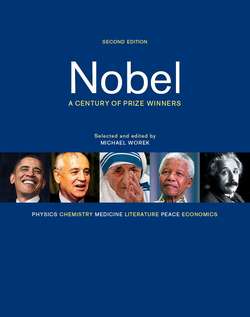Читать книгу Nobel - Michael Worek - Страница 17
На сайте Литреса книга снята с продажи.
ОглавлениеIvan Pavlov (1849–1936)
1904 Physiology or Medicine
In recognition of his work on the physiology of digestion, through which knowledge on vital aspects of the subject has been transformed and enlarged.
Ivan Petrovich Pavlov was born in Ryazan, Russia, into a religious family. Following in the footsteps of his father, a parish priest, and his grandfather, a sacristan, the young Pavlov began his studies in the church school and continued them at the local seminary. However several influential teachers, including a renowned Russian physiologist, inspired the young Pavlov with a passion for scientific knowledge. Under their influence, he abandoned his religious studies in 1870 to study science.
After obtaining a bachelor’s degree in the natural sciences, Pavlov decided to pursue his interest in physiology and enrolled in the Academy of Medical Surgery in Saint Petersburg, where he graduated with distinction. Pavlov remained in the institution on a fellowship while also acting as director of the physiology laboratory. In 1890 he was invited by the Institute of Experimental Medicine in Saint Petersburg to administer the Department of Physiology, a position he accepted and held until the end of his life.
Pavlov contributed to the understanding of the heart and circulatory system, but it was his work in the physiology of digestion that earned him the 1904 Nobel Prize in Medicine. To this day his work is associated with the concept of the conditioned reflex, which he demonstrated through an unconventional experiment; having previously associated the ring of a bell with the appearance of food, he trained a hungry dog to salivate at its sound.
Pavlov also enjoyed a fulfilling private life with his family. In 1881 he married a teacher who was a friend of the famous writer Dostoyevsky. A woman of firm character, she was admired by her husband and dedicated her life to the home, their four children and religion.
Pavlov was not afraid of defending his ideas, even when his words were directed at the most important figures in his country. In 1922, as Russia struggled with its revolution, Pavlov asked Lenin’s permission to transfer his laboratory abroad. Lenin refused and instead offered to increase the amount of food available to him, to which Pavlov boldly responded, “I will not accept these privileges unless they are given to all my collaborators as well.”
Two years later he again brought himself into the spotlight when sons of parish priests were expelled from the Military Medical Academy in Saint Petersburg, where he lectured on physiology. He resigned from his post saying, “I am also the son of a priest, and if they are expelled, then so am I!”
Throughout his life, Ivan Pavlov received numerous honors, among them an honorary doctorate from Cambridge University and acceptance into the Order of the Legion of Honour from the Medical Academy of Paris.
